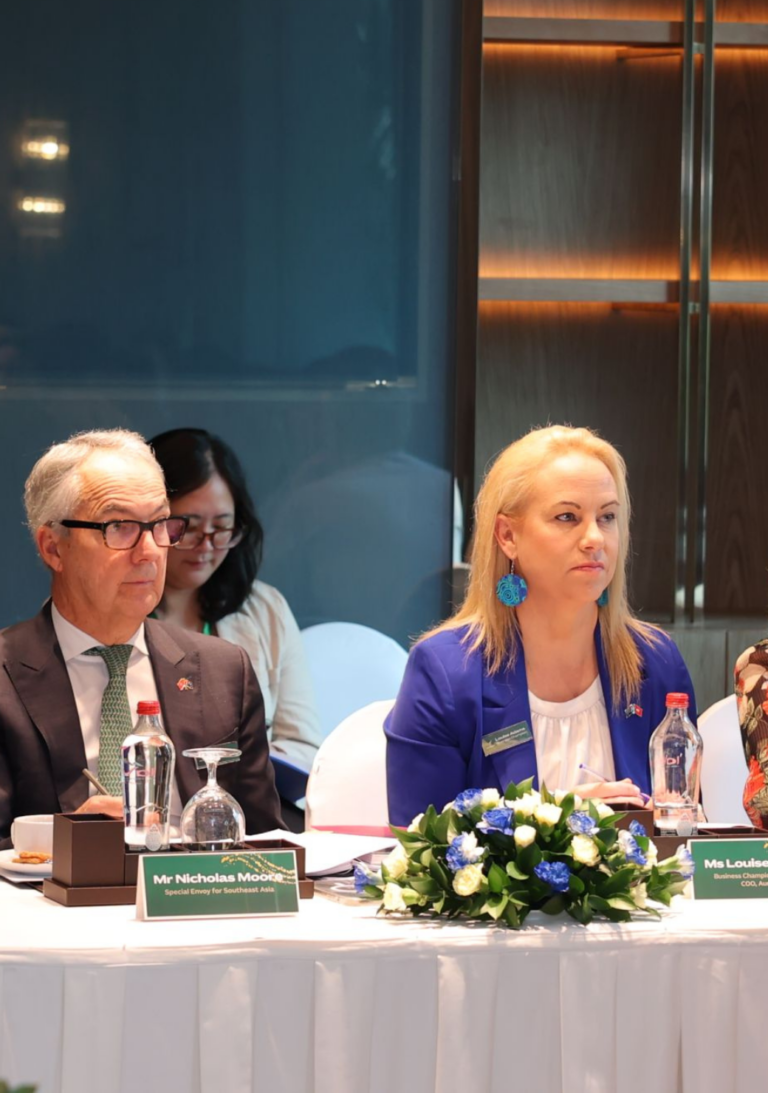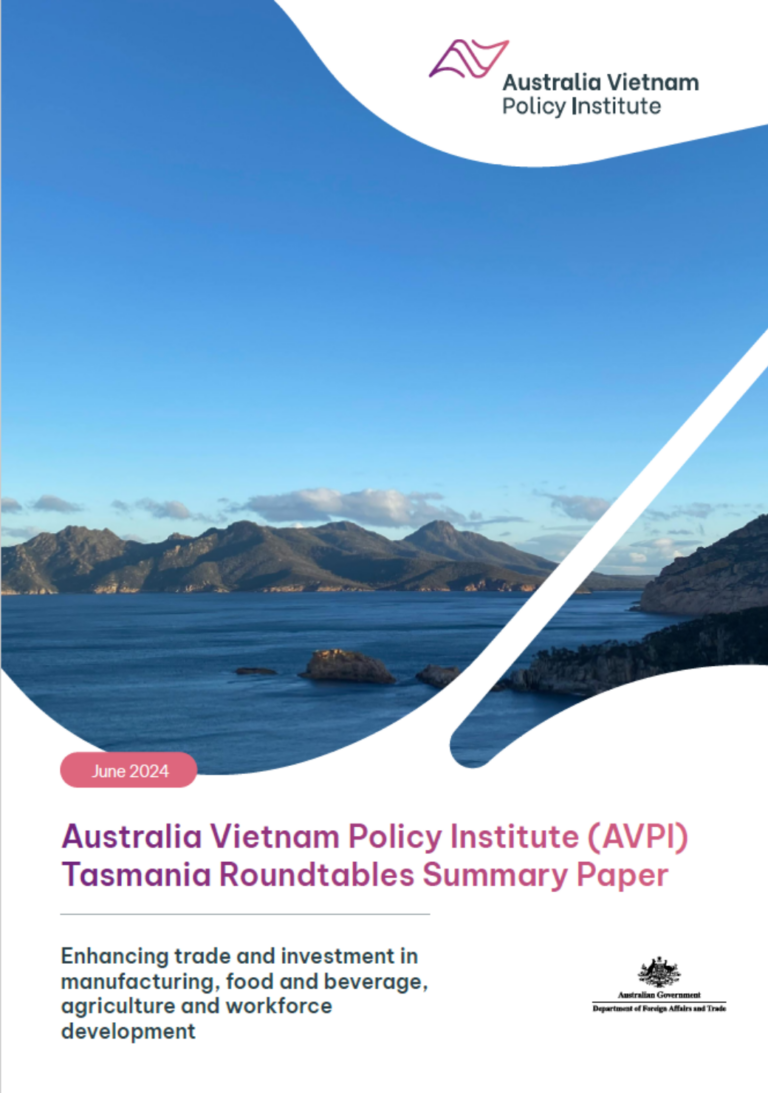Viet Nam: Post-COVID Economic Performance
Key messages
Viet Nam’s effective management of COVID-19 and the recent reopening of travel, tourism, and transport services, combined with the sustained policy focus on improved and equitable health, education outcomes, economic restructuring, and reforms aimed at stimulating business investment and employment, should help ensure that Viet Nam continues to emerge from the pandemic with rising incomes and living standards, and a burgeoning middle class. This will provide new economic opportunities for Australian firms to commercially engage with Viet Nam. However, with the ongoing anti-corruption drive and rising social interest in environmental and equity issues, investors will need to be even more aware of the importance of building relationships with reputable partners in Viet Nam.
Economic rebound
The Vietnamese economy has rebounded strongly from the 6 per cent contraction in the third quarter of 2021, driven by a strong recovery in manufacturing. Following the partial easing of COVID-19 restrictions, growth in employment, incomes and economic output continued to accelerate during the first five months of 2022. Increased investor and consumer confidence and incomes, and the release of suppressed demand and forced savings are boosting domestic demand. Growth is returning to key service industries, especially tourism and hospitality.
Viet Nam’s mostly effective management of the pandemic and economic recovery – with strong containment, relatively few deaths, and a rapid vaccination rollout — have boosted confidence and facilitated the easing of restrictions and economic recovery. This effective management, combined with continued progress in laying the foundations for sustained medium-term growth, provide sound reasons to be optimistic about economic prospects for 2022 and beyond.
Some domestic drivers of growth
Although the pandemic imposed considerable hardships on many households, workers and businesses, Vietnamese private businesses have demonstrated resilience with a continuing appetite to invest in expansion. While businesses closures increased, and new business registrations grew at a slower rate in 2021, growth in business numbers has accelerated again over the last six months. Increased private investment is becoming increasingly pivotal in generating new employment opportunities. Total domestic private sector investment increased by 7.2 per cent in 2021, despite declines in state sector investment and a slowing in disbursements of foreign direct investment.
Aiming to ameliorate the economic impact of the pandemic, the government has renewed efforts to reduce institutional and infrastructure bottlenecks and ensuring that all businesses compete on a level playing field. The government has committed to increasing expenditure on health, education, and infrastructure, and to sustaining limited business support. As the government re-focuses its attention on broader socio-economic development issues, a recovery in flows of public investment is expected in 2022.
And Viet Nam’s domestic middle class continues to expand, contributing to accelerated growth in domestic consumer demand. Increasing domestic demand is beginning to gradually reduce past dependence on international trade as the primary engine of growth. Reductions in travel restrictions will also release pent-up demand for some goods and services. As travel and trade restrictions ease, those Vietnamese consumers that have survived the crisis with minimal economic losses will want to travel, entertain, and consume more goods. Initially, this expenditure is likely to be concentrated within Viet Nam, helping to stimulate domestic economic activity.
External drivers of growth
The pandemic has resulted in global slumps in equity markets, travel and tourism, disruptions to global supply chains, factory closures, and increased unemployment in 2020. These developments, combined with global public concerns about the impacts of climate change, technology, automation and job losses, digital economy, low returns on savings, economic inequality, and rising debt, added to investor uncertainty and undermined consumer confidence. Nevertheless, the global economic recovery began to recover in 2021, with the International Monetary Fund forecasting global economic growth of about 5 per cent in 2022.
Many multinational firms are trying to minimize supply chain risks by reducing their dependence on single input markets. Foreign investors have been moving production bases, from China, to Viet Nam (and elsewhere in Asia). Many are trying to strengthen production links with domestic firms. Vietnamese enterprises are increasingly integrating into global production chains, boosting investment, technology transfer, productivity growth and incomes. Recently implemented regional economic cooperation agreements are also helping to further deepen regional supply chain links, boosting trade and foreign investment, and providing new opportunities for businesses in Viet Nam.
Structural change
The transfer of resources out of low productivity agriculture into higher value-added manufacturing sector has been an important driver of recent productivity growth. There have also been structural changes within sectors, for example, the gradual shift from rice production to higher value-added agriculture, horticulture, and agro-processing sectors. The relative importance of logistics, standards, finance, and e-commerce are also increasing. Other positive structural developments include increased urbanization, the growing participation by domestic firms in regional value chains, and the emerging transition towards more sophisticated manufacturing and services activities.
Technological progress is stimulating innovation and accelerating the country’s drive to “catch up” in terms of productivity, product and service quality, and per capita incomes. Domestic and foreign businesses are investing more in skills, ICT, robotics, fintech and other emerging industries, with new models of business activity emerging (e.g., involving e-commerce, and online education, health, and entertainment services) that have the potential to further boost productivity growth while also reducing health risks. The efficiencies generated from the shift to e-transactions in both public sector and private business is stimulating productivity growth and helping to reduce opportunities for corruption.
Anticorruption Drive
The Communist Party-led anti-corruption drive has led to arrests of high-level officials, political leaders, and entrepreneurs, presenting increased short-term investment risks for investors. Businesses need to recognize that it takes time and resources to fully understand the business environment and to build solid relationships with reputable business partners. Due diligence on potential business partners has always been important in Viet Nam. It is becoming even more important.
In the longer term, a successful anti-corruption drive can be expected to help increase competition and competitiveness and lay the foundations for more sustainable and equitable long-term development. Reductions in corruption should also make it easier for firms that have relatively strict corporate governance standards to compete with firms that have less qualms about engaging in dubious business practices. Success in containing corruption should also help reduce the risks of social and political instability.
Risks and responses
Some of the biggest risks to the Vietnamese economy are global. These include the ongoing pandemic, the impact of the Ukraine crisis, a slower than expected global economic recovery, rising inflationary and interest rate pressures, likely tightening of fiscal policy in major markets, uncertainty about economic growth prospects in China and the USA. Other critical factors that are negatively impacting on the global outlook include the impacts of – and tepid global response to – climate change, and growing protectionism and possible instability in some major markets. Maintaining macroeconomic stability in Viet Nam will be challenging given the need for deficit spending to ameliorate the negative economic impacts of COVID-19, expected rise in international inflationary pressures, and ongoing supply chain constraints.
But there are also domestic risks that could especially impact vulnerable groups. Firstly, the re-emergence of global pandemic conditions could stifle the revival of domestic travel and services and potentially slow economic recovery.
Secondly, environmental and climate change risks are growing and are an increasing concern for Vietnamese society and businesses. Environmental deterioration will undermine efforts to promote sustainable development, improve health and the quality of life, and attract and retain the best national and international expertise in Viet Nam.
More broadly, the government still needs to: strengthen education and health outcomes; facilitate the movement of workers out of declining industries; strengthen social safety nets (especially for informal workers); further improve the business environment; address infrastructure bottlenecks; and accelerate public investment and improve investment efficiency. There is also a need for a renewed focus on building market institutions to provide an effective and predictable policy and regulatory environment. Vietnamese policy makers also need to continue to monitor and provide appropriate support to those in Viet Nam most adversely impacted by the pandemic, climate change/disaster impacts, and ongoing economic restructuring.
Implications for business and economic development
While domestic businesses will continue to face pressures to restructure and adapt, Viet Nam is becoming an increasingly and productive economy. Domestic drivers of economic performance are likely to include strong domestic and private investment growth, a recovery in public sector investment, innovation and technological change, increased consumer demand, and government stimulus measures. Notwithstanding the risks discussed earlier the country should continue to record relatively strong growth in incomes, employment, trade and FDI inflows in 2022. With the ongoing ant-corruption drive and rising social interest in environmental and equity issues, investors need to be even more aware of the importance of building relationships with reputable partners in Viet Nam.
______
Raymond Mallon, is an Economist and a Visiting Fellow at the Australia Vietnam Policy Institute (AVPI). The views, thoughts, and opinions expressed in the text are the author’s own and do not necessarily reflect the position or views of the AVPI or its partners.
If you are interested in becoming an AVPI Visiting Fellow, please email [email protected] or express your interest via the AVPI Contact Form.











